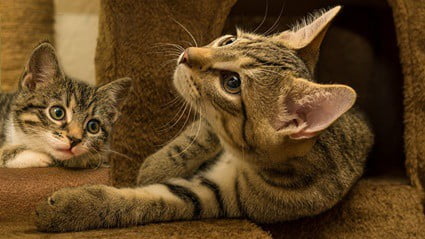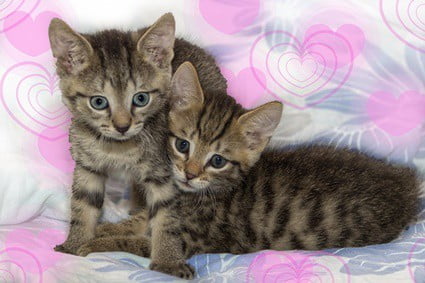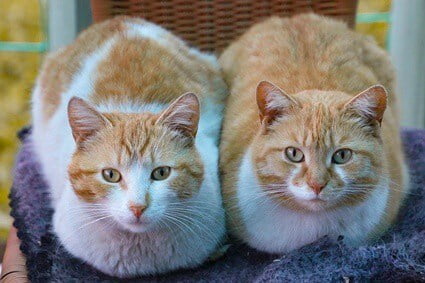Feline siblings spend a lot of time with each other in their early years as littermates and companions. Unfortunately, closely related cats will mate with each other, leading to genetic problems.
Cats’ siblings may mate as they reach their reproductive stages. To prevent this from happening, ensure that your cats are neutered or spayed before they’re 6 months old. Line breeding or inbreeding isn’t recommended unless you’re familiar with the lines behind your cats.
Why cats mate with their siblings perplexes owners. But once you understand the reasons behind it, it’s not that complicated at all. The complex part is what happens when sibling cats do mate.
Do Cats Mate with Their Siblings?
Mating is a basic instinct for cats, so brother and sister cats do mate with each other.
When a female goes into the estrus cycle (in heat), a male cat will follow its instinct to pass on its genes. The cat’s body chemistry will tell it when to mate and when it’s the right time for female cats to reproduce. So, cats will mate, even if they’re from the same litter.
That’s not to say that inbreeding always occurs naturally, though. A study in Brill looked into the female control of paternity during copulation. Researchers found that overall, female cats avoid inbreeding with their close kin during copulation but not with their distant relatives.
When looking at feral cats isolated from other colonies, they have no choice but to breed with their siblings and other family members to keep the colony going. However, the report shows that feral cats prefer to find a mate not within their direct bloodline if other cats are available.
Can Brother and Sister Cats Have Kittens?
Kittens can be sexually mature as early as 4 months old. Female kittens can conceive from around this age, while male kittens can impregnate a fertile female. This can be a problem if you have 2 cats from the same litter that haven’t been neutered.
If a female kitten becomes impregnated at 4 months old, there’s every chance that the cat could produce its own litter at only 6 months old. That’s because a cat’s gestation period is just 63 days, which experts believe is too young for a cat to be producing her first litter.
Cats are indiscriminate creatures, which means a brother may mate with his sister because he doesn’t recognize her as family. More than anything, they’re playmates.
To prevent sibling inbreeding, get the brother and sister cats neutered before they reach puberty. If you’re looking for a couple of cats to become household pets, choose same-sex cats from the same litter. That way, you’re reducing any risk of sibling mating while still providing a playmate for one another.
Can You Breed Half-Sibling Cats?
Inbreeding between half-sibling cats is just as common, if not more so, as inbreeding between full sibling cats. In the world of cat breeding, purposefully mating half-siblings is known as ‘line breeding.’
Line breeding involves matings between second-degree relatives, including half-siblings. The process reduces the risk of inherited disorders compared to the mating of first-degree relatives, but it doesn’t remove the risk entirely. Any form of inbreeding can cause health problems.
Inbreeding of not-too closely related cats is preferred by professional breeding bodies over full-blooded mating. As described in the GCCF Breeding Policy, breeding half-siblings produce kittens that conform to a particular breed’s integrity and physical and genetic characteristics.
What Happens If Cats from The Same Litter Mate?
If cats from the same litter do mate, there’s every chance that their kittens will be born healthy with no obvious genetic issues.
With luck, the litter produced will have all the desired physical and personality traits without any major defects. Inbreeding can be a significant risk, and there’s usually no way of knowing whether health issues will occur until the litter’s born.

Similar Physical Traits
Cats born through inbreeding will often inherit certain characteristics specific to their breed, including certain physical traits that are considered attractive.
This could be the size of their legs, more or less fur, or the same skull shape. For cat breeders, this allows them to achieve the best prices when selling cats.
Similar Personality Traits
It’s not just physical characteristics that an inbred cat will inherit, but the personality traits, too. This is why mating cats from the same litter is done by cat breeders, as they can shape the temperament that the litter is born with.
Breeding sibling cats can produce a calm temperament or a playful demeanor if the parent cats share the same personality. In all likelihood, it’s because they’re related. This can be attractive to owners looking for a specific cat to fit in with their lifestyle.
Mate with Caution
If inbreeding continues too often, serious health problems tend to occur time again with some of the more pedigree cat breeds.
According to Scientific Reports, 64.9% of Persian cats studied recorded at least one disorder. As Persians are one of the most inbred breeds, this high statistic begs the question: ‘is it safe for cats from the same litter to mate?’
There’s the morality of the practice to consider, too. Inbreeding isn’t socially acceptable to humans, so many critics have issues with manipulating nature to achieve the desired result.
Inbred Cat Symptoms
Inbreeding occurs when closely related cats mate. This includes brother and sister, father and daughter, mother and son, and half-siblings.
Cat breeders often use inbreeding to predict how their kittens will look, particularly pedigree breeds. Inbreeding enables breeders to keep track of their cats’ prestigious bloodlines while fixing their bad traits. Also, they can promise certain characteristics to buyers looking for something specific in a feline.
However, inbreeding isn’t without its problems. Not only is it seen as ethically and morally wrong, but cats born through inbreeding can experience various health complications.

Genetic Defects
Inbreeding increases the risk of genetic defects. Though more likely to occur in pedigree cats, all inbred cats are vulnerable. Inherited disorders arise due to abnormal genes passed down through the generations. They can be obvious at birth, while others may not present themselves until later in life.
The limited gene pool caused by continued inbreeding means that harmful genes become widespread, causing the breed to become sickly and weak.
As a natural by-product, buyers aren’t usually willing to purchase a cat with obvious health issues, rendering the animal unsaleable. Breeders will often choose to put the animal to sleep because it doesn’t meet the requirements.
Overbreeding
Cats regularly bred with cats from the same bloodline will eventually produce unhealthy litters.
Classic overbreeding symptoms include small litter sizes with only 1-2 kittens. These kittens may be born with a series of abnormalities, including a misaligned jaw, crooked nose, uneven eyes, and teeth and mouth defects.
Also, other issues can occur. This includes low fertility in female cats, immune deficiencies that result in a high death rate, and cancers in infant cats.
Maintaining Breed Purity
A less worrying outcome of inbreeding is achieving purity through line breeding.
By mating cats with a less direct bloodline, such as cousins or half-siblings, they’ll preserve the breed’s vigor while reducing the rate of genetic decline. The benefit to the breeder is that they can predict the litter’s characteristics and appearance before the kittens are born.
If you’re intentionally breeding sibling cats or cats from the same litter, you should do so with caution, as inbreeding is never a guaranteed process.


A feral kitten has adopted me. It started when I fed Joey and his siblings on my porch. Then he called me in the evening for his dinner. I live in Texas, where it has been very hot so I let him lay inside my door. Then his came right into my living where he napped. Of course, I had to get him toys. We had an understanding that he had to leave when I go to bed. Now I have to coax him out over night. I can’t afford to get his shots or to neuter him or take care him if he gets sick. Nor can I afford pay for additional rent for pets.
Can I keep our relationship the way it is or would it be better for Joey if I just kept my doors closed and stop feeding him? I’ve afraid he will forget how be a feral kitten and will not fit in the gang.
Thank you.